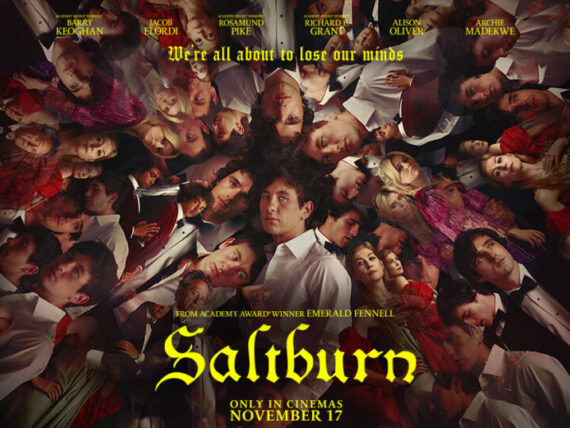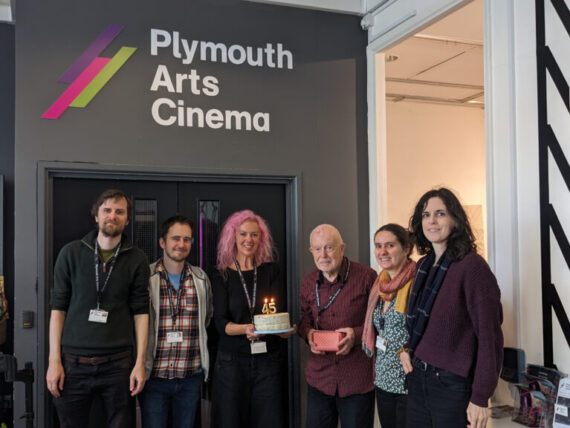A truly innovative piece of film-making, the Afro-futurist musical Neptune Frost is daring and transgressive.
Pitched in Burundi, one of the world’s poorest nations, Neptune Frost conceives an alternate reality, a few years from now. Brothers Matalusa (played by rapper Kaya Free) and Tekno (Robert Ninteretse) work in an open-pit Coltan mine – the mineral used to power smartphones. The workers sing as they dig, but they are supervised by guards who dish out brutal punishments. Tekno – a dreamer, unsuited for this work – briefly pauses to imagine himself in another dimension. A guard whacks him with the butt of his gun. Tekno falls onto rocks and is instantly killed.
In his grief, Matalusa stages a walk-out. The event reverberates with his fellow miners and they end up following him into the hilltops of Burundi. Together they form an anti-capitalist collective. Their aim is to hack the authoritarian regime that is growing ever richer off their work. At the same time, we are introduced to Neptune, described by the film’s directors Anisia Vzeyman and Saul Williams as an “intersex runaway”. Played by Elvis Ngabo and Cheryl Isheja, Neptune roams the countryside and, narrowly escaping sexual assault, they find their story converging with that of Matalusa. The two meet, and together, they begin to envisage a fairer society. The past injustices cannot be undone, but they do not have to be repeated.
The film purposefully steps away from the traditional, linear narrative, moving into magic realism at a moment’s notice. This is not a straightforward take down of capitalism, the method of story-telling is much looser. Themes announce themselves with little ceremony; the plot dissolves in the latter part of the film as scenes jostle against each other. A collage of ideas hang in the air – but the burning unfairness of being an outsider and all that entails – is what holds the piece together. This is an almost overwhelming multi-sensory experience, but there is truth-telling at its core. Neptune Frost is not afraid to tackle what is difficult and uncomfortable.
What is particularly interesting about Neptune Frost is that it may look futuristic, but it does not totally break away from film history: it dips into popular culture, with references to The Wizard of Oz. Here Matalusa walks down not the Yellow Brick Road, but a red earth dirt track, on the journey to find what he is looking for. Neptune Frost adheres to the musical genre quite closely: the energetic, pulsating song and dance scenes articulate a deeply felt rage and frustration; something that polemic can’t quite capture. There is an irresistible, defiant note throughout the film that pulls you along with it. The characters use the greeting “Unanimous Goldmine” as a cheeky nod to their ancestral ownership of the land. Neptune takes on several influences, and its exuberant, technicolour vibe is reminiscent of Damien Chazelle’s La La Land: although the intensity in Neptune Frost builds into a much larger statement. Finding the joy, Vzeyman and Williams suggest, is key to resistance.
Neptune Frost also sits within a more recent cinematic trend, and comparisons cannot help but be drawn with the Black Panther phenomenon. But where the successful movie franchise bolts African aesthetics and history onto a pre-existing superhero genre, Neptune Frost rejects any story that is not its own. What starts with an unflinching glimpse into the workings of a Coltan mine develops into a no-holds-barred riff on contemporary life, where binary ways of thinking are broken apart. The old certainties are not just questioned, they are dismantled in front of our eyes. The irreparable cost of capitalism feeds into other oppressions: politics, gender, religion and technology and they are re-framed from a developing world’s perspective. In its disruption of societal codes, Williams’ screenplay not only implies that developing worlds end up paying the debt for Western material excesses, but that the systems used to keep us in check are no longer fit for purpose. It is time for something different if we are to move forward.
This is a film that paints outside the lines, and it does ask a lot of its audience in terms of engagement: a passive response would not feel appropriate. Neptune Frost may be a challenging, genre-blending fantasy, but its willingness to get down into the issues of where we are right now, feels authentic and genuinely inspiring. Where Black Panther borrows, Neptune Frost builds from scratch.
Reviewed by Helen Tope








Comments
No comment yet.